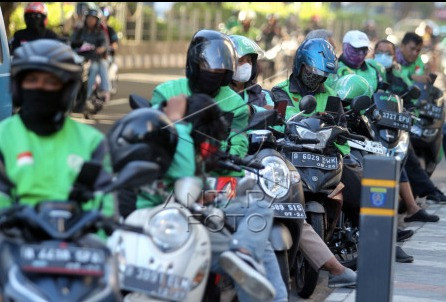With Nadiem on board, off toward Gojek nation we go?
The burning questions have gravitated from skeptical — What does he know about education? Wouldn’t it be a waste of talent to put him there? — to sarcastic: Are all young graduates going to become public transportation drivers?
Change Size
 Culture and Education Minister Nadiem Makarim after the announcement of Indonesia Onward Cabinet on Wednesday. (JP/Seto Wardhana)
Culture and Education Minister Nadiem Makarim after the announcement of Indonesia Onward Cabinet on Wednesday. (JP/Seto Wardhana)
T
he rumor that Gojek founder Nadiem Makarim was joining President Joko “Jokowi” Widodo’s new Cabinet had excited the nation for months. Only 35 years old and known as the brains behind the country’s first unicorn, he has become the poster boy of success for Indonesian youth. Not only for the educated, urban class but also those who live in remote towns on islands outside Java.
Even if you cannot go to Harvard or be bright enough to grow a tech company, you can still be inspired by his innovation that has redefined how people travel, consume and do business. Even Jokowi was a fan — continually praising Gojek and expressing how he aspires to push the country toward the digital economy.
But the mood has translated into a chorus of disappointment since Jokowi announced on Wednesday that Nadiem would not become a digital economy minister or join the economic team.
The son of prominent lawyer Nono Anwar Makarim has been appointed as the education and culture minister, a Cabinet post perceived as less prestigious and traditionally given to academics or members of Muhammadiyah, the country’s second-largest Islamic organization and among the nation’s pioneers in education.
The burning questions have gravitated from skeptical — What does he know about education? Wouldn’t it be a waste of talent to put him there? — to sarcastic: Are all young graduates going to become public transportation drivers?
Jokowi, whose ambition is to transform Indonesia into a developed economy by 2045, has made it apparent that human development is a major goal in his second and final term, while the digital economy is his chosen path to take the country there.
When introducing Nadiem to the Cabinet, he said he had picked Nadiem because he expected him to make “breakthroughs” in human resources development, to prepare human resources who are ready to work and meet industry demand.
As a tech entrepreneur, Nadiem knows what it takes to build a start-up company and the human resources required to support it, and therefore he is expected to be able to plan and produce more human resources that are entrepreneurial and savvy with digital technologies.
But creating millions of talented young people scattered across thousands of islands is of course a daunting task. It is more complicated than finding and hiring the best talent for a company.
The new journey is going to take him around the country to figure out how the education system works and how he can improve it — and, unlike Gojek, which has secured millions of dollars of investment, it has to be done under the limitation of the state budget.
To begin with, Indonesia’s quality of basic education remains poor compared with other countries despite the government allocating about 20 percent of its annual budget for education for the past decade, in line with the Constitution’s requirement for education.
The University of Washington’s Institute for Health Metrics and Evaluation revealed last year that Indonesia ranked 131st out of 195 countries in 2016 in human development. The country is behind Vietnam, Thailand and Malaysia, which ranked 85th, 72nd and 79th, respectively. According to the 2018 Human Development Report produced by the United Nations Development Program, Indonesia ranked 116 out of 189 countries, falling one place from its 2016 position.
Complicated bureaucracy and corruption have long plagued the system, meaning that many programs initiated by the ministry fail to reach desired results.
Rather than the shrewdness required of a CEO, leading a bureaucracy requires patience and, moreover, the humility of a leader who is willing to take time to go around and roll up sleeves to fix what’s broken.
There are of course priorities as well as time and budget constraints. Is the digital education going to be part of the curriculum applied at secondary schools or university programs? Are there going to be vocational schools especially set up to produce digital talent?
And as much as there should be a clear program to implement education reform, it is also important for the government to have a blueprint for digital-economy development. Are there going to be more companies that offer services and payment solutions like Gojek and Grab? Or is the government preparing human resources for more massive transformation that also offers solutions for other sectors like manufacturing, health care and agriculture?
Ride-hailing services are part of the gig economy, a market system where digital platforms allow people to earn money through short-term engagements — like driving passengers or buying food. Although it may work in the first few years, many labor issues arise when people start to count on it for life. This is why it may be better for the government to develop more fundamental and basic digital skills and capabilities that can be used across companies and sectors.
After all, the new job will require Nadiem to do much more than what he has done for Gojek. What lies ahead of him is a challenge that will test his character and perseverance. Because unlike on the Gojek app, if he underperforms, he cannot just cancel orders with Jokowi giving him one star.
For all the criticism, Jokowi apparently sees Nadiem as the most suitable education minister, with the future of the country’s young generations on his shoulders.









